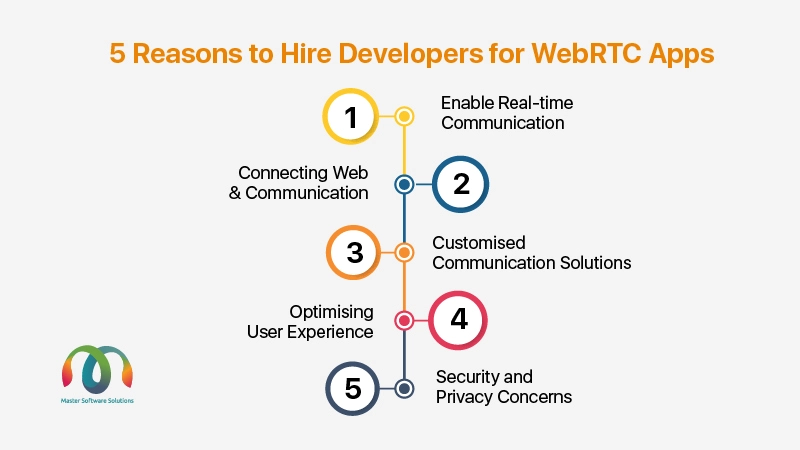WebRTC Developers: 5 Reasons to Hire Them

Real-time communication has become a significant development in the landscape of web development in recent years. With the skyrocketing demand for seamless video conferencing platforms, collaborative tools, and customer support systems, webRTC has emerged as a game changer that has enabled WebRTC developers to build powerful browser-based applications with real-time audio, video, and data capabilities. This makes it crucial to hire webRTC developers and using their expertise to fit into the modern web landscape is important.
WebRTC is an API-based technology called open source projects that allows peer-to-peer real-time communication in web browsers and applications. The technology allows for the transmission of video, audio, and data sharing.
In this article, we discuss and know why it is crucial for companies to hire developers for webRTC apps to remain relevant in today’s web environment.
Read More: WebRTC- The Developing Web Technology You Should Know About
5 crucial reasons to hire developers for webRTC apps
1. Enable real-time communication
WebRTC allows developers to directly integrate real-time communication capabilities into web applications. It doesn’t require any third-party plugins or apps to do so. The technology uses a combination of open standards, which include HTML5, javascript, and various other communication protocols to establish peer-to-peer connections between the browsers and the applications. WebRTC developers have the required skills and knowledge to use the technology to build applications with seamless audio and video communications, data transfer, and collaboration in real-time.

2. Connecting the web and communication
Conventionally, web apps could not facilitate quick and interactive communication due to their static or asynchronous characteristics. The technology allows developers to create dynamic and engaging web apps, supporting communication in real time. It enables users to engage in video conferencing, screen sharing during online presentations, exchange files, and even collaborate with others in real time. This is done within the confines of a web browser.
3. Customised communication solutions
WebRTC developers can tailor real time communication solutions according to the requirements of the specific business. From developing a doctor consultation platform with live chat and video call abilities to creating interactive e-learning with virtual classrooms, webRTC can develop customised applications to meet these communication needs. They hold a good understanding of webRTC protocols, APIs, and best practices that allows them to build a secure, scalable, and reliable communication solution.
4. Optimising user experience
The user experience is crucial in any web application, and real time applications are no exception. Developers of webRTC play an important role in optimising the user experience and making sure low latency, high-quality audio, and video streaming and the real time features work seamlessly. Having a good understanding of webRTC mechanisms for adaptive bitrate control, network congestion management, and echo cancellation allows them to deliver smooth and immersive real time communication experiences.
5. Security and privacy concerns
Real time communication web applications deal with sensitive data, which makes it crucial to consider security and privacy seriously. The developers are well-versed in implementing encryption protocols, authentication mechanisms, and secure signalling channels to safeguard user data. They understand potential vulnerabilities that are related to webRTC and can use healthy practices to minimise risks and protect user privacy.
Real-time communication has become an integral part of modern web applications and its importance continues to grow. To grow in the modern web landscape, it is critical to hire webRTC developers to optimise user experience, build customised solutions, and address security concerns. They hold the skill set that can contribute to shaping the future of web development, enabling seamless, interactive, and immersive experiences for users in different industries.
